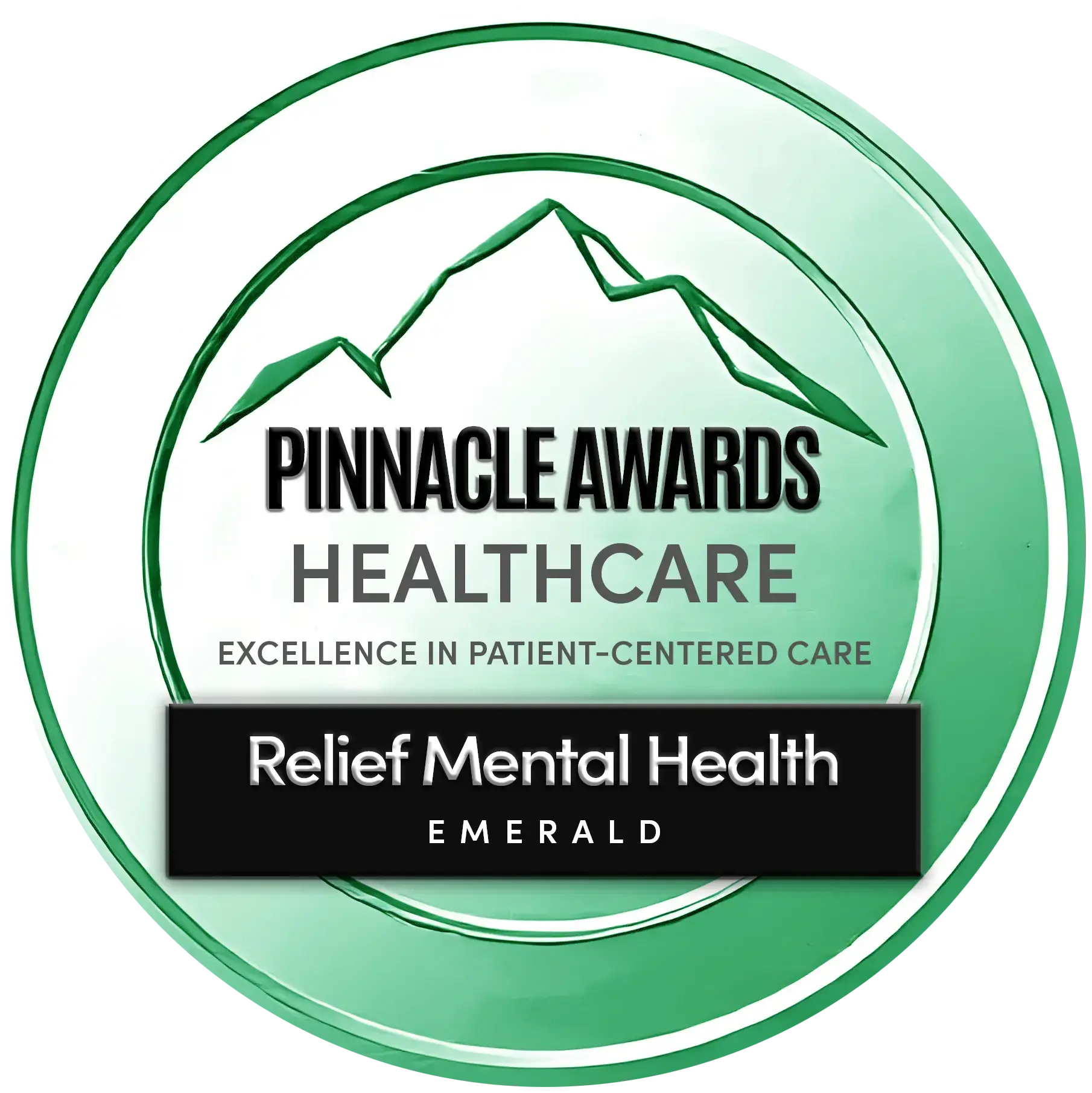
Transcranial magnetic stimulation (TMS) can help improve mental health in older adults, including seniors with treatment-resistant diagnoses such as depression.
Our mission is to support people of all ages, children through seniors, with mental health conditions like depression, anxiety, and others, but also because we know that depression is not a normal – or typical – part of life at any age.
Here’s how the CDC describes depression:
Depression is Not a Normal Part of Growing Older
“Depression is not just having “the blues” or the emotions we feel when grieving the loss of a loved one. It is a true medical condition that is treatable, like diabetes or hypertension.”
The important takeaway from that statement is the phrase “treatable medical condition.” That means depression – and other mental health diagnoses – are not mysterious or beyond our understanding or ability to manage. It means they’re treatable, as the CDC indicates, just like a medical condition such as diabetes or hypertension.
That applies to everyone, seniors or not. Mental health conditions respond to treatment like other health conditions. With the appropriate treatment, delivered by licensed and experienced healthcare providers, people with mental health conditions can experience symptom improvement, and in many cases, total remission of symptoms related to mental health conditions.
In other words:
Mental health treatment can work.
If people think depression is a normal part of getting older – but isn’t – then they may think there are other parts of getting older – that aren’t. Or, maybe they think there are parts of getting older that are inevitable, but they can’t really do anything about. We’re thinking now about conditions such as Alzheimer’s disease and dementia related to Alzheimer’s disease.
What we know about these conditions is this: there’s a new, innovative treatment available that can help seniors with the symptoms of depression and has also been shown effective in reducing symptoms associated with Alzheimer’s disease and dementia.
This new, innovative treatment is called transcranial magnetic stimulation (TMS). We’ll discuss the details about TMS and the various ways it can help older adults and seniors in a moment. First, we’ll offer the latest prevalence data on depression and other mental health conditions among older adults and seniors.
Mental Health Conditions Among Older Adults and Seniors: Facts and Figures
The Diagnostic and Statistical Manual of Mental Disorders (DSM-V) refers to depression as major depressive disorder (MDD) and defines MDD as:
“…an overwhelming feeling of sadness, isolation, and despair that last two weeks or longer at a time.”
Experts identify the most common risk factors for depression – for all demographics – as follows:
- Genetics:
- Family history of depression
- Mental health history:
- Previous mental health diagnosis
- Major life changes, trauma, and stress
- Major/chronic illness or injury
- Presence of alcohol/substance use disorder
Those are the basic risk factors for developing depression. However, older adults (age 50+) and seniors (age 65+) have a slightly increased risk of developing depression related to factors associated with age. The first age-related factor is relatively obvious: older adults and seniors have simply lived more years than younger people, which has exposed them to more significant life experiences, both positive and negative. This variety and volume of experiences overall increases the likelihood of experiencing the basic risk factors for depression we mention above, such as the major life changes, trauma, and stress.
In addition, older adults and seniors share the following risk factors, distinct from people in younger demographic groups:
- Chronic illness/disease, such as cancer
- Body image and functionality: amputation, cancer surgeries, or the physical consequences of heart attacks/strokes can have an a negative impact on how a person experiences and sees themselves in the world
- Fear of death with increasing age
- Social isolation/loneliness/living alone
- Constant aches and pains in muscles and joints
- Recurring minor illnesses
- Grief and mourning related to loss of a loved one/loved ones
Those conditions are a fact of growing old. Not all of us become ill or develop chronic conditions. But inevitably, over time, our bodies and our minds begin to lose optimal function, which can contribute to depression in older people and senior.
Mental Health Diagnoses Among Older Adults and Seniors
Statistics as reported in the 2021 National Survey on Drug Use and Health (2021 NSDUH):
Any Mental Health Diagnosis
- Adults 50+: 15.0% (17.7 million)
- Adults 65+: 11.9% (698,000)
Serious Mental Health Diagnosis
- Adults 18+: 5.5% (14.1million)
- Adults 50+: 2.5% (3.0 million)
Received Treatment for Mental Health Condition
- Any mental health condition, adults 50+:
- Received treatment: 47% (8 million)
- Received medication: 39% (6.7 million)
- Serious mental health condition, adults 50+”
- Received treatment: 71% (2 million)
- Received medication: 61% received (1.8 million)
Those statistics show the situation clearly: millions of older adults and seniors have mental health diagnoses, and millions currently receive treatment.
Depression Among Older Adults and Seniors
Major Depressive Episode (MDE)
- Adults 50+: 4.5% (5.3 million)
- Adults 65+: 2.8% (1.5 million)
MDE With Severe Impairment
- Adults 18+: 5.7% (14.5 million)
- Adults 50+: 2.9% (3.4 million)
- Adults 65+: 1.3% (739,000)
Received Treatment for MDE
- Adults 18+ with MDE:
- 0% received treatment for depression (12.6 million)
- 18-25: 51.1% (3.1 million)
- 26-49: 63.5% (5.9 million)
- 50+: 68.2% (3.5 million)
- Adults 18+ with MDE with severe impairment:
- 8% received treatment for depression with severe impairment (9.1 million)
- 18-25: 56.7% received treatment (2.4 million)
- 26-49: 66.6% received treatment (4.3 million)
- 50+: 71.8% received treatment (2.3 million)
In this last set, we shared the statistics for younger age groups to make a point: older people and seniors seek and receive treatment for mental health diagnoses, including depressive disorders, at higher relative rates than younger people.
This means that they understand something important: treatment works, and if there’s a treatment that works, it’s important to engage in that treatment. That’s why we want to tell older adults and seniors about transcranial magnetic stimulation (TMS): if they know about it and think it might help, they’re likely to initiate treatment.
Older Adults and Seniors: Alzheimer’s Dementia and Cognitive Decline
Before we talk about TMS though, we’ll share data on another condition common to older adults and seniors, Alzheimer’s disease dementia. Here’s the data:
- 5.8 million people in the U.S. have Alzheimer’s disease-related dementia
- That’s 10% of people age 65+
- The percentage of Alzheimer’s dementia increases with age:
- 65-74: 3%
- 75-84: 17%
- 85+: 32%
According to the Alzheimer’s Association, 93 percent of older adults believe cognitive decline is a normal part of aging, but only 40 percent would talk to their doctor immediately upon recognizing any signs of cognitive decline in themselves. At the same time, 70 percent would initiate treatment early if they knew of a treatment that could help mitigate age-related or Alzheimer’s dementia.
Which brings us to our topic: transcranial magnetic stimulation for older adults and seniors with mental health diagnoses.
What is Transcranial Magnetic Stimulation?
Transcranial magnetic stimulation (TMS) is a safe, effective, non-invasive therapy that’s approved by the Food and Drug Administration (FDA) for the following mental health diagnoses:
- Treatment-resistant depression
- Depression with suicidal behavior
- Anxious depression
- Obsessive-compulsive disorder (OCD)
TMS works by emitting targeted electromagnetic pulses to specific brain areas through specially designed coils or cap-like devices placed on the head. In most cases, patients receive treatment in an outpatient office. Treatments last about 20 minutes. Advantages of TMS include:
- TMS is durable: the effects of TMS can last for months
- No anesthesia is required
- No systemic side-effects are associated with TMS
- Some patients may experience mild headache or irritation at the coil/cap site
TMS and Depression in Older Adults
- A meta-analysis conducted in 2015 on 26 studies of TMS in older adults confirmed the safety and efficacy of TMS treatment for depression for older adults
- A meta-analysis conducted in 2021 on 14 random controlled trials of TMS in older adults with depression showed:
- Significant reduction of severity of depressive symptoms, compared to placebo
- Significant reduction of overall symptoms, compared to placebo
- High rates of total remission, compared to placebo
- The Hebrew Senior Life Study at Harvard University showed TMS is an effective, safe depression treatment for geriatric depression
TMS and Alzheimer’s Dementia
- A meta-analysis conducted in 2019 on 15 random controlled trial on the impact of TMS on dementia showed:
- Significant improvement in cognitive tasks
- Significant improvement in memory tasks
- A meta-analysis conducted in 2021 showed TMS is a valid diagnostic tool, and may improve cognition in dementia related to:
- Alzheimer’s disease (significant improvement in cognition)
- Parkinson’s disease (mild improvement in cognition)
- Frontotemporal Lobar Degeneration (moderate improvement in cognition)
- Dementia with Lewy Bodies (moderate improvement in depression, cognition not studied)
- Vascular dementia (mild improvement in executive function)
It’s important to recognize that currently, TMS is FDA-approved for treatment-resistant depression, depression with suicidal behavior, anxious depression, and obsessive-compulsive disorder (OCD). For Alzheimer’s dementia and other forms of dementia, off-label is allowed. What that means is that if evidence shows the treatment is effective for a certain condition – before formal FDA approval – and both the patient and physician completely understand the risks and benefits, then treatment is allowed.
TMS for Depression and Dementia in Older Adults: How it Can Help
Older people and seniors have increased risk of depression for various reasons, including the physical, emotional, and psychological consequences of aging.
TMS can make all the difference for seniors with depression or treatment-resistant depression (TRD). TMS is a non-invasive, medication-free treatment. No one wants to spend time on treatments that aren’t effective, and this fact becomes more salient as we age. In addition, the side-effects of psychiatric medication can cause complications, which increase in the older and senior population. Therefore, for older adults and seniors with depressive conditions – who are more likely to seek and receive treatment than their younger counterparts, as the data above show – treatment with TMS is a practical, realistic alternative depression treatment for older adults.
With regards to dementia, the off-label use of TMS shows promise, and some studies indicate it can significantly improve cognition. However, the same studies indicate that ideally, more research is needed, particularly with regards to dosage. Dr. David Cappon, lead author of the Harvard Study we cite above, describes the current situation with regards to TMS for dementia:
“Multisite stimulation combined with training seems to enhance cognitive performance with particularly high efficacy, but systematic studies in dementias other than AD are still lacking.”
Beneath the dense language, what that means is that for dementia associated with Alzheimer’s disease, data shows TMS is effective, but for other forms of dementia, more research is needed.
TMS is a safe and effective treatment for both depression and treatment resistant depression in older adults and seniors, and can lead to significant improvement in symptoms. Evidence shows the off-label use of TMS for Alzheimer’s dementia is also safe and effective.
Taken together, this research shows that for older and/or senior adults, the new, innovative generation of treatment for mental health diagnoses shows real promise in symptom reduction, symptom remission, and can lead to improved quality of life and overall wellbeing.


